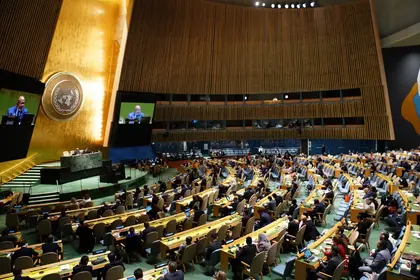The UN Human Rights Council on Thursday, Oct.12, extended the mandate of its rapporteur on rights violations in Russia by a year, in a second diplomatic defeat for Moscow in three days.
The United Nations' top rights body adopted a resolution brought by several European countries to prolong Bulgarian human rights expert Mariana Katzarova's work for another year.
JOIN US ON TELEGRAM
Follow our coverage of the war on the @Kyivpost_official.
On Tuesday in New York, countries scotched Russia's bid to rejoin the 47-member Human Rights Council, having kicked Moscow out in April last year following its invasion of Ukraine.
In Geneva on Thursday, the UN's top rights body inflicted another diplomatic blow on Russia, passing the resolution on the special rapporteur by 18 votes to seven.
Argentina, Britain, France, Germany, Ukraine and the United States were among the countries backing the resolution.
China, Cuba, Eritrea, Kazakhstan and Vietnam voted against prolonging Katzarova's mandate.
Some 22 countries abstained, including India, Malaysia, Mexico, Pakistan, South Africa and the United Arab Emirates.
In October 2022, the council decided a special rapporteur was needed for Russia, amid concerns over an intensifying domestic crackdown by Moscow during its war in Ukraine.
Katzarova is the first UN-backed monitor of the rights situation in any of the five permanent member states on the UN Security Council.
- 'Embarrassing' -
The resolution passed Thursday calls on Moscow to establish "constructive communication and full cooperation" with Katzarova and allow her unhindered access, including to meet freely with civil society and individuals in detention.

North Korea’s Ballistic Missile with 1,200–3,000 km Range Spotted in Russia
Moscow has refused to let her in and not recognised her mandate.
"No country is above scrutiny, no matter how upsetting or embarrassing they find it; no matter how strong their military is... and no matter how aggressively they threaten or cajole other countries," US ambassador Michele Taylor told the council before Thursday's vote.
Luxembourg's ambassador Marc Bichler, presenting the resolution, said: "Just like all human beings everywhere, the inhabitants of Russia deserve to live freely and enjoy all of their human rights... regrettably, the authorities have decided otherwise."
The resolution said it was gravely concerned at the "continued significant deterioration of the situation" of human rights in Russia, citing reports of "the extrajudicial killing of government critics and severe restrictions" on freedom of opinion.
It also voiced alarm at reported mass arbitrary arrests, "the lack of an independent judiciary, the denial of the right to a fair trial... the blocking and forced closure of nearly all independent media outlets" and "cyber-surveillance to control information and intimidate and silence critics".
- 'Sophisticated' repression -
Presenting the findings of her first report last month, Katzarova said repression in Russia had soared since Moscow's full-scale invasion of Ukraine in February 2022, reaching levels not seen since Stalinist times.
"The level of repression against the civil society independent media, and generally anybody with a dissenting voice... is unprecedented in recent history," she told reporters.
She lamented Moscow's "enormous crackdown" on critics since invading Ukraine.
"Civic society in Russia has been closed by the authorities," she said, adding that the "repression is very sophisticated", with new laws presented virtually every week "to stifle" any form of criticism or dissent.
Before Thursday's vote, British ambassador Simon Manley said the special rapporteur was a "vital link between the international community and the oppressed people of Russia".
China's representative said the council was becoming "increasingly politicised and confrontational".
Cuban ambassador Juan Antonio Quintanilla Roman said such resolutions were "only intended to point the finger at certain states for geopolitical purposes".
Russia declined the opportunity to take the floor.
You can also highlight the text and press Ctrl + Enter






